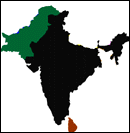Pakistan joins other foreigners in Sri Lanka's war
[TamilNet, Saturday, 14 June 1997, 23:59 GMT]
The Tamil Tigers say they have independent confirmation that Pakistani officers are involved in planning the current Sri Lankan army offensive in the Vanni. The Pakistanis join several other foreign elements involved in Sri Lanka's war in the Tamil homelands.

In a statement, the LTTE said that "Pakistani officials converged at Sri
Lanka's Anuradhapura
army headquarters immediately prior to the launch of the military
offensive, which has now run into difficulties following Tuesday's LTTE
strike at Thandikulam."
Both Sri Lanka and Pakistan have, denied the charge, citing different
reasons: Pakistan said the war was an 'internal matter' in which Pakistan
would not involve itself and the Sri Lankans said they did not need any
foreign assistance.
Neither reason is borne out by recent developments in the region.
Pakistan has been repeatedly accused by India of involvement in the
Kashmiri conflict. Pakistan is also known to be involved in the
Afghanistan's conflict, backing the fundamentalist Taleban militia. The
Sri Lankan government has solicited support from the United States and
Indian military and several East European mercenaries are active on the
island.
The Pakistani officials denied the LTTE claim at a press briefing in
Islamabad. In Colombo, a spokesman from the Pakistani High Commission
also told the Reuters agency ``We totally deny it. The conflict is an
internal affair of Sri Lanka. Pakistan does not interfere in the internal
matter of any country".
However, it is an open secret the Islamabad has been instrumental in
providing weapons, funds and training to the Taleban militia in
Afghanistan. A correspondent for the (London) Times has seen Pakistani
intelligence personnel (distinctive in their suits) within Afghanistan.
The India government has also repeatedly accused the Pakistani's of
backing the Kashmiri insurgency, and the area has seen sporadic artillery
fire exchanges between the two countries.
Pakistan also considers Sri Lanka an ally, and the two countries have
assisted each other in the past. The spokesman also told Reuters ``We
would be the last country to interfere in the internal affairs of
a friendly country like Sri Lanka,''
Pakistani jets are believed to have refueled in Colombo during bombing
missions into India in the last Indo-Pakistan war. Pakistan has rushed
ammunition and other equipment to Sri Lanka during previous offensives
against the LTTE. Many Sri Lankan officers are trained in Pakistan
(ironically as well as in India).
The Sri Lankans said they did not need outside assistance in the war. The
Sri Lankan military spokesman told the AFP news agency "We are quite
capable of sorting things out on our own militarily as far
as the LTTE is concerned".
However, several foreign elements are assisting the Sri Lankan military.
The US embassy in Colombo recently confirmed that several US officers,
had been involved in training the Sri Lankan army. In 1991, Sri Lanka
formed a close alliance with China, and several naval craft and aircraft
have been delivered, along with support personnel.
In addition, Western defense analysts say that Israeli and Ukrainian
personnel are maintaining the Sri Lankan Air Force's aircraft. Recent
attempts to hand over to Sinhalese technicians have contributed to a drop
in standards and the loss of several aircraft.
A US company, Lioncorp, is flying cargo in SLAF An-24 transports from
Colombo to Palali, as the Sri Lankans are desperately short of pilots.
Ukrainian and Russian pilots are also flying other Sri Lankan aircraft in
combat. At least one air crash has been attributed to 'language
difficulties' between Sri Lankan and foreign pilots.
An Mi-24 gunship recently shot down by the LTTE was being flown by two
Russian mercenaries. The SLAF has been also been attempting to recruit
foreign nationals who are seeking to build up flying hours to qualify for
advanced pilot's licenses.
In February 1996, the Indian navy tracked an LTTE supply ship and were in
attendance when Sri Lankan aircraft and gunboats sank it. The Indians
previously intercepted another LTTE supply ship (which was scuttled) in
defiance of international shipping law: an Indian court recently ruled
that the interception was illegal.
In the mid-Eighties, the Sri Lankan government hired several hundred
British and South African mercenaries to fight the Tigers. The South
Africans arranged the supply of armored vehicles and other equipment from
the Apartheid regime. However, following repeated atrocities by the
undisciplined Sri Lankan army, the mercenaries resigned en masse.
Sri Lanka fends off international concern about the high intensity
conflict and offers of mediation with the dismissive claim that the
island war is an 'internal' matter. However, the range of nationalities
of the foreigners serving with the Sri Lankan military makes the conflict
a truly international one.











 In a statement, the LTTE said that "Pakistani officials converged at Sri
Lanka's Anuradhapura
army headquarters immediately prior to the launch of the military
offensive, which has now run into difficulties following Tuesday's LTTE
strike at Thandikulam."
In a statement, the LTTE said that "Pakistani officials converged at Sri
Lanka's Anuradhapura
army headquarters immediately prior to the launch of the military
offensive, which has now run into difficulties following Tuesday's LTTE
strike at Thandikulam."